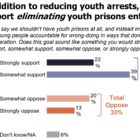
Californians Lean Toward Eliminating Youth Prisons in New Survey
|
California’s juvenile prisons have long had a poor reputation as mere stops on the way to grown-up prisons, overcrowded places where reform or rehabilitation were rarely achieved.
Juvenile Justice Information Exchange (https://jjie.org/tag/california-endowment/)

California’s juvenile prisons have long had a poor reputation as mere stops on the way to grown-up prisons, overcrowded places where reform or rehabilitation were rarely achieved.

A new report based on research of three California school districts suggests that school children exposed to so called, “zero tolerance” policies may be taking a toll on their mental health and wellbeing. The report, funded by the California Endowment and coordinated by Human Impact Partners (HIP), Community Asset Development Re-Defining Education (CADRE) and Restorative Justice Partners (RJP), examined three student populations in Los Angeles, Oakland and Salinas, California. It found that youth enrolled in middle and high schools that practiced zero tolerance policies were much likelier to have higher stress levels than students attending schools using alternate disciplinary models, such as positive behavioral interventions and supports (PBIS) and restorative justice (RJ) programs.
Researchers believe that stress levels are major components regarding students’ mental health and that elevated stress levels may even lead to shorter life expectancies for the populations studied. Additionally, the researchers state that students enrolled in schools using PBIS or RJ disciplinary models were, on average, more likely to have higher grades, test scores and overall attendance rates than students enrolled in schools using zero tolerance, also called exclusionary disciplinary programs. The report also says that students enrolled in schools with zero tolerance programs have higher dropout rates, participate in fewer extracurricular activities and are referred to special education programs more frequently than students attending schools with alternative disciplinary polices in place. The report states that a majority of schools in the United States use “zero tolerance” disciplinary policies, which frequently result in severe punishment - such as expulsion or arrest - for infractions involving weapons, drugs, threats and in some instances, insubordination or cursing.

"Negative health outcomes for African-American and Latino boys and young men are a result of growing up in neighborhoods of concentrated disadvantage, places that are more likely to put boys and young men directly in harm’s way and reinforce harmful behavior." That's the key finding from the report entitled: "Healthy Communities Matter: The Importance of Place to the Health of Boys of Color." The report, which is filled with facts and figures and underwritten by The California Endowment, finds:
When it comes to health and other outcomes, the odds for boys and men of color are more than two times worse than they are for white boys and men in California. African-American and Latino children are 3.5 times more likely to grow up in poverty than their white counterparts. In fact, nearly half of the nation’s African-American and Latino fourth graders attend schools that are characterized by extreme poverty.